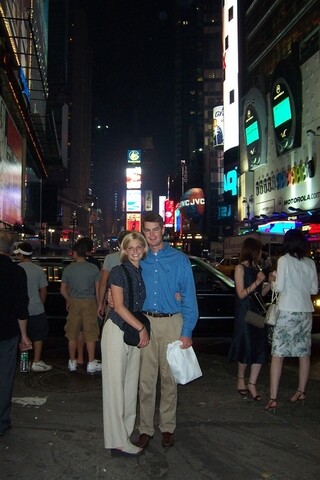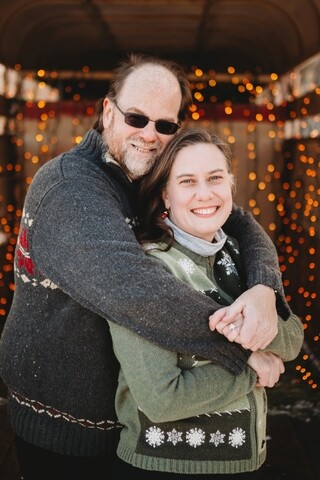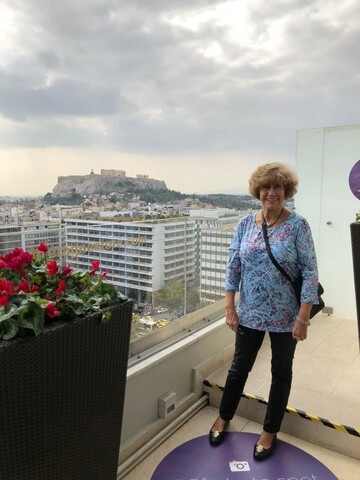Editor’s note: This article was first published in the September/October 2021 issue of LDS Living magazine.
Ten years after the terrorist attacks on the World Trade Center, Pentagon, and United Airlines Flight 93, The New York Times remembered that horrific day, saying, “Ultimately, each person attaches an individual meaning to 9/11, if possible. Outside of the families of the victims, most people’s lives may not present themselves as remarkably different. But there is residue, lingering wisps of Sept. 11.”1 Ten years may have passed since those words were written, but the wisps of 9/11 remain.
The wisps of 9/11 can teach us something powerful—if we let them. I spoke with four Latter-day Saints who called New York City home at the time of the attacks. Each had a distinct, life-altering experience that day, offering us something to remember when we hear the admonishing phrase to “never forget” September 11.
Jonathan Gardner: Remember to Love One Another

“I had just graduated [from] college with a finance degree from the University of Utah, and I was going to do the Wall Street thing. Of all the places to live, I ended up choosing to live in an apartment complex . . . three or four blocks away from the Twin Towers.
“On the day of the attacks—I remember this like it was yesterday—I had taken the 5:00 [a.m.] train on the green line up to our office, which was . . . in what we call the midtown area of Manhattan. In our [office] we had all of these TVs showing the market [and] the headline stories. When the first plane hit one of the towers, we didn’t really understand what had happened—we thought it was a small, little crop-duster-type plane that had lost control . . . [but] then when the second plane hit, the entire world stopped. Suddenly, people were glued to the TVs.
“Ultimately, we left the office building. . . and there was nowhere to go. I couldn’t go to my apartment; it was a terror zone. The subways weren’t running, the buses weren’t running, the taxis weren’t running; everything was closed in terms of transportation.
“Everyone piled into the streets. And when I say everyone, I mean like the entire city . . . just walked in the middle of the roads. We walked north, and [at] about five o’clock that night, the city finally opened up some trains . . . I remember getting onto the train and sitting next to a guy who was just covered in soot and ash. I mean, complete dust all over him. He sat right next to me, and everyone was quiet. Hardly anyone was talking . . . it was like nothing I’ve ever experienced in New York. I served my mission in Brooklyn and Queens, I’d done an internship there the year before, and this is a raucous city. But that day, it was quiet.
“This guy I was sitting next to, I looked at him and I said, ‘You must have been pretty close to the towers.’ And he looked at me and said, ‘Yeah.’ And I said, ‘How close were you?’ And he said, ‘I got out of the 77th floor . . . I was told to go up, but I went down.’ And because he went down, he made it out alive. I didn’t say anything more to him and he didn’t say anything more to me.
“The anniversary of 9/11 is more deeply rooted than just a couple of buildings that went down. It is [just] as much our heritage as Americans. Today, you can see there’s a lot of strife—politically and culturally—and this incident, when it took place, showed that we were one people, and that we were prepared to protect one another.
“So as [we] commemorate the 20 years, I think we really need to commemorate that we are one, and that we are much more alike than we are different, and that it’s okay to love one another. . . .We want to remember that the towers went down, and we’re always going to [be] sad for the lives that were lost, but I want to remember [that] it was a time when the nation came together. We stood as one people ready to protect and make others feel secure.”
Ronnie Bishop: Remember the First Responders

“I was living in New York City in 1996 working for Sony Music [Entertainment] doing classical music research, but then my career took a left turn—I decided to go into federal law enforcement. I went back to school and got a master’s degree in criminal justice and started a job at Six World Trade Center in August 2001.
“About three weeks later, I left the city to go down to Georgia for training. I had been there for a week when September 11 happened. We went to the break room for snacks and there was a TV in there, and we heard the news that a plane had hit the North Tower. We didn’t think that much of it because other planes had flown into tall buildings in New York before.
“But then an hour later we had our break and we found out the second tower had been hit, and then it was obvious that something was not right here. Then [we heard] the tower fell down, and it was just horrific. [If I hadn’t been at my training], I would have been getting out of the subway and walking toward my building when the first plane hit . . . it was surreal.
“I had actually been somewhat inactive in the Church at the time, and this incident made me seek out things to keep me grounded, and I ended up going back to church while I was down there in Georgia. It was the thing that kept me centered and made me feel like I had a place where I belonged.
“My husband, Rich, was one of the first responders. He was on a volunteer squad in New Jersey [and] received the phone call to go assist at about the time that the second plane struck the World Trade Center. He still remembers the drive into the city vividly, as his vehicle was the only one driving into New York City while there were traffic jams going the other way. He arrived on the scene just as the second [tower] collapsed, and he was already inside on a lower floor of the [first tower] helping to evacuate people when the order came through to get out as the building started to rumble, indicating its imminent collapse as well.
“He remained on ‘the pile’ at Ground Zero for six weeks during the rescue effort, which sadly became a recovery effort very quickly. He sustained injuries and went to the hospital when part of the structure collapsed on him, but [he] returned to the scene as soon as he was released. He is now retired from the emergency services.
“We want people to remember that there are people out there whose jobs [are] to put their lives on the line to help others, and to respect that. [My husband] never runs into a building expecting to die; he expects to come out alive, go home, and keep living his life. First responders deserve our gratitude every day that they put their lives on the line and make their wives nervous they might never come home again.”
Liesel Davis: Remember to Do Hard Things With God

“I was attending grad school at New York University in their food studies program. We had just started the fall semester so we’d only gone to class a few times before [9/11]. This girl and I were desk partners, and I was just starting to get to know her. Our lives only crossed for a short time, but I will never forget her. I just won’t.
“She worked in the [North Tower at] a big-deal restaurant called Windows on the World. The thing that really breaks my heart is that she wasn’t from the US—she’d come here specifically to do this program [at NYU]. She was in this moment in her life and living in this place that was about making her dreams come true, [but] because she was there that morning for her shift, she died when the planes crashed.
“As [a] class we wrote letters to her family, and I just remember it was the hardest thing. What can you possibly say to parents who’ve lost their child? But it felt especially hard when it’s like, ‘Oh, we sent our daughter off to this foreign country and something that you never would have ever thought happened here, happened.’
“I didn’t know what their religious background was, but I so wanted [them to know,] ‘There is a Heavenly Father who loves you and is aware of you, and knows your family, and knows your daughter, and knows these experiences, and within the context of the plan of salvation there’s a place for all of this.’
“It’s not like knowing that you are going to see loved ones later doesn’t mean you don’t miss seeing them now. But I think when you know to feel that love, feel that grace and support from our Savior and our heavenly parents, there’s something about that that changes the experience. It takes the rough edges off. The ache may exist, [but] it exists within a space that still has grace and balm and healing, which is totally different than that achy place where there’s nothing really to answer it. . . . Hard things are still hard, but it’s totally different doing something with God than without God.”
Ursula Melendi: Remember Whom We Rely On

“I remember exactly where I was when I heard about the attacks. Some things you never forget. I was [on a trip to Germany and] in a store in Bavaria . . . when a gentleman came in and said to the store owner, ‘Well, the streets are empty because the Americans are in the hotels watching TV.’ And the store owner said, ‘Well, why is that?’ And he explained to him that a plane had gone into one of the towers of the World Trade Center.
“My friend and I went to the nearest church—we didn’t even know what church it was—but we were both so upset because we both had children [in New York City], and we just didn’t know what was happening. . . . The only one we [could] turn to in times like that was Christ and our Heavenly Father.
“We were able to get our regularly scheduled flight home, and [during the trip back] there was a terrible feeling. . . . They searched everyone and all the planes very thoroughly so we were horribly delayed [and just] couldn’t wait to get home.
“Going over the bridge to Staten Island, we looked, and the towers were gone. There was nothing left; it was horrible. I didn’t go downtown until maybe a week after I got back, and everything was covered in a white powder. It was very eerie seeing the powder over everything—the cars, the houses, the streets, the sidewalk.
“I remember all the churches were packed with people, because all of a sudden they realized there was stability there in a very uncertain world. These are the last days . . . and I think there is only one thing we can do: focus on the gospel of Jesus Christ.
“Most of our wonderful things come from our Heavenly Father. We have to realize that if we do things that are right, then we will be blessed and shown the way we should go. And we always do. That is the only thing we have in this life; it’s the only constant—the gospel.”
▶ You may also like: ‘One step at a time’: What 1 woman’s escape from the 99th floor of the South Tower on 9/11 can teach the next generation


